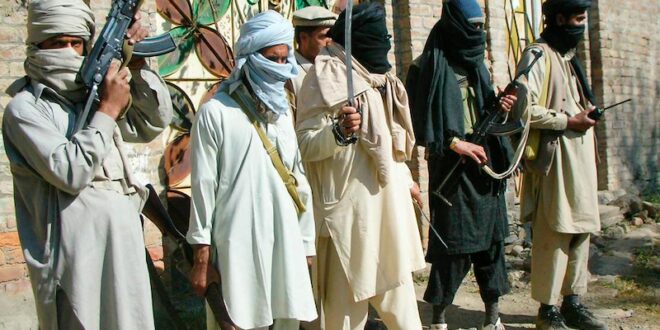Recently, the Tehrik-i-Taliban Pakistan (TTP) made headlines with a propaganda video that seems aimed at discrediting Pakistan and its law enforcement agencies (LEAs). The video suggests that Pakistan and its LEAs are unable to eliminate TTP hideouts, bases, and strongholds.
While such propaganda attempts are not new, it is essential to delve deeper into the motivations behind such actions and the actual ground realities that often go unnoticed. The TTP’s propaganda campaign appears to serve multiple purposes. Firstly, it attempts to supplement the public narrative and policies of the Afghan government (IAG), which seeks to alleviate international pressure. By shifting the focus towards Pakistan’s alleged inability to tackle the TTP, the aim might be to divert attention from the persistent issues within Afghanistan.
One of the core messages in the TTP’s propaganda is an attempt to convey that Pakistan, not Afghanistan, is the problem. However, the facts on the ground paint a different picture. The TTP has relocated to Afghanistan following military operations in Pakistan in 2008. It even fought alongside the Afghan Taliban against the United States and NATO forces and has established operational and planning bases in Afghanistan, which are internationally acknowledged, as evident from a UN Security Council report dated August 23. Post-2021, the TTP’s boldness surged, following the U.S. withdrawal and the Taliban’s takeover of Afghanistan. Several TTP leaders have met their demise in Afghanistan, even acknowledged by TTP leaders themselves. The group’s current commander, Noor Wali Mehsood, has been giving interviews to media outlets from Afghanistan. Cross-border attacks, border fence cutting, and links with Al-Qaeda, as highlighted in the UNSC report from August 2023, further underscore the TTP’s presence in Afghanistan.
Despite such propaganda efforts by the TTP, Pakistan remains resolute in its stance against terrorism. Pakistan’s armed forces and LEAs, with the support of its people, are committed to eliminating the TTP threat. The establishment of the “Writ of the State” in formerly non-administered tribal areas after immense sacrifices is a testament to Pakistan’s commitment to peace and stability. Pakistan firmly declares that there are no “No Go Areas” within its borders. The state and its LEAs have established governance apparatus even in the Tribal Districts, leaving no space for terrorist organizations to thrive. Pakistan’s resolve against terrorism remains unshaken, and it will not tolerate terrorism within its borders.
It is crucial to recognize that the TTP has become a liability for the Afghan government, not an asset. This extremist group poses a threat not only to Pakistan but also to Afghanistan and the international community at large. Even British High Commissioner for Pakistan, Jane Marriott, praised Pakistan’s sacrifices in the War on Terror and acknowledged the presence of TTP and other terrorist organizations in Afghanistan.
As Pakistan seeks clarification from the Afghan government regarding the British envoy’s remarks on the TTP’s presence in Afghanistan, it is imperative for the Afghan government to take decisive action against these terrorist threats. The Afghan government must realize that the TTP and other terrorist organizations are a common enemy, and their presence in Afghanistan only hinders the government’s efforts for recognition and stability.
While propaganda may attempt to distort the reality of the situation, it is essential to rely on facts and international reports to understand the dynamics of the region fully. Pakistan remains steadfast in its commitment to eradicating terrorism, and cooperation between Pakistan and Afghanistan is crucial to address the common enemy that threatens both nations and global peace. The international community also has a role to play in supporting efforts to eliminate terrorist threats in the region and promote stability. Furthermore, it is crucial to acknowledge the sacrifices made by Pakistan’s armed forces and LEAs in the fight against terrorism. These sacrifices, often at great personal risk, have contributed to regional and global security. Pakistan’s dedication to combating extremism should serve as a model for other nations facing similar challenges.
Additionally, the international community must recognize that terrorism is a global issue that transcends borders. A coordinated effort is required to root out terrorist organizations and dismantle their networks. The presence of groups like the TTP in Afghanistan underscores the need for a comprehensive and collaborative approach to counterterrorism. In light of recent developments, it is imperative for the Afghan government to clarify its position regarding the presence of the TTP and other terrorist organizations on its soil. Addressing this issue transparently and taking concrete actions to combat terrorism will not only benefit Afghanistan but also contribute to regional stability and security.
In conclusion, the challenges posed by extremist groups like the TTP require a multifaceted and cooperative response. Pakistan remains committed to eradicating terrorism within its borders and seeks constructive engagement with its neighbors and the international community to address this shared threat effectively. The path to lasting peace and stability in the region lies in unity, cooperation, and a resolute commitment to combating terrorism in all its forms.
 Eurasia Press & News
Eurasia Press & News




